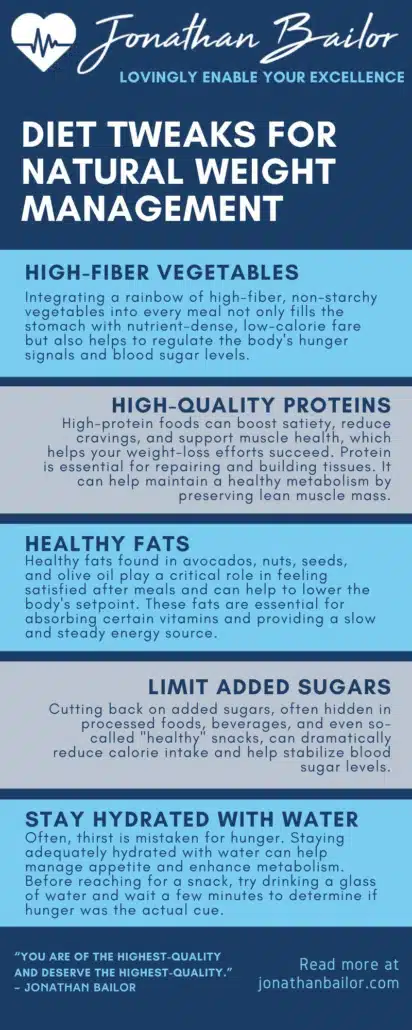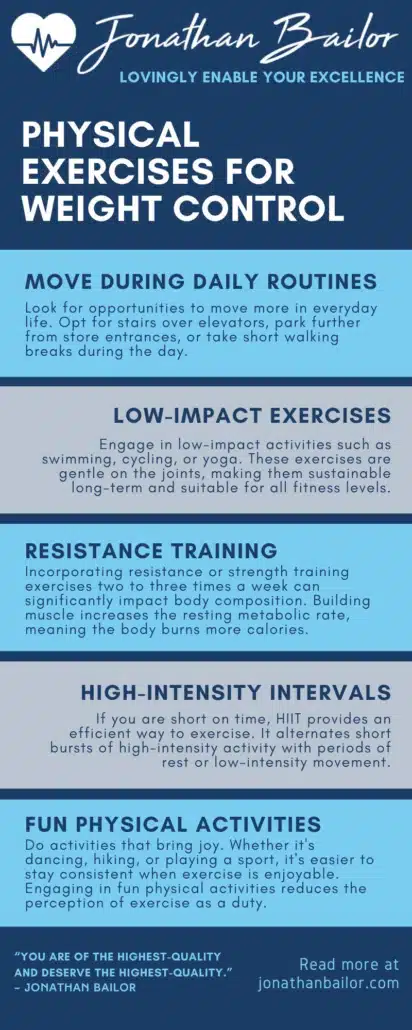20 Easy Strategies for Sustainable Weight Loss Without Counting Calories
For decades, the mantra for weight loss has been clear and unwavering: count every calorie, eat less, and exercise more. Starve yourself if you want to lose weight fast. Yet, as the scale stubbornly refuses to budge for so many, it’s time to question whether this age-old advice is truly the golden ticket to body transformation. It turns out that the secret to sustainable weight loss isn’t in the relentless tracking of every bite but rather in understanding and adjusting the body’s weight setpoint. In this Hormone Health Guide with Jonathan Bailor, this key aspect is explored in depth, offering insights into how to achieve lasting wellness beyond calorie counting and the scale.
The concept of the body weight setpoint is a game-changer. It suggests that everyone has a natural weight range that their body fights to maintain, regardless of their daily calorie intake. A complex interplay of hormones, genetics, and lifestyle factors regulates this setpoint. When the setpoint is high, losing weight becomes a battle against biology. However, the great news is that this setpoint is not fixed. It can be lowered through methods that don’t involve calorie counting or restrictive dieting, making weight loss not just possible but sustainable.
Imagine liberating oneself from the shackles of calorie counting and instead focusing on nourishing the body with what it genuinely needs to thrive. It’s about making peace with food, seeing it as a friend rather than an enemy, and allowing the body to gravitate towards its optimal weight naturally.
This article explores 20 straightforward and achievable strategies for lowering the body’s weight setpoint. These aren’t quick fixes or trendy diets but are founded on a deep understanding of the body’s workings. From the types of foods that naturally regulate appetite and boost metabolism to the role of sleep and stress reduction in weight management, each strategy is a piece of the puzzle in achieving lasting weight loss.
As this journey unfolds, remember that sustainable weight loss is about shedding pounds and gaining a healthier, more vibrant life. It’s about making choices today that your future self will thank you for. And it’s about sharing this journey with others, inspiring friends and family to embrace a healthier lifestyle without the burden of counting calories.
Feel encouraged to share this journey. Whether through social media or a heartfelt email, spreading the word about a more compassionate and scientifically grounded approach to weight loss can inspire others to embark on their own path to wellness. After all, when the focus shifts from counting calories to nourishing the body and mind, weight loss becomes a joyous side effect of living well.
4 Essential Lifestyle Shifts for Sustainable Weight Management
When embarking on a journey toward successful weight loss that is sustainable, the focus often zooms in on diet and exercise. However, lasting change is built on a broader foundation. It involves weaving a tapestry of habits throughout your lifestyle, touching on aspects often overlooked yet equally pivotal.
These adjustments extend beyond the plate and the gym, infiltrating every corner of daily life with the promise of a lighter body and a richer, fuller existence.
1. Prioritize Sleep Quality and Quantity
A restful night’s sleep is not just a luxury—it’s a cornerstone of health. Skimping on sleep can upset the delicate balance of hunger-regulating hormones, leading to increased appetite and cravings for high-calorie foods.
Aim for 7-9 hours of quality sleep per night, establishing a serene bedtime routine while creating an environment conducive to rest. This simple adjustment can significantly impact the body’s natural weight regulation mechanisms, making weight management less of a struggle.
2. Cultivate Stress-Reducing Practices
Chronic stress is a silent saboteur of weight management efforts, encouraging fat storage, especially around the midsection. Incorporating stress-reduction techniques such as deep breathing exercises, meditation, or even leisurely walks in nature can lower cortisol levels, the body’s stress hormone, thereby aiding in adjusting the body’s weight setpoint towards a healthier equilibrium.
3. Foster Social Connections
The power of community and social connections to influence health behaviors and stress levels is profound. Engaging regularly with friends and family or joining groups with similar interests can provide emotional support, reduce stress, and indirectly assist in managing weight.
These connections remind us that we’re not alone on this journey, making the path to wellness more enjoyable and sustainable.
4. Optimize Your Living Environment
The spaces where time is spent subtly yet profoundly impact lifestyle choices. Creating an environment that encourages movement—such as keeping a yoga mat in sight or opting for a standing desk—can nudge daily habits in a healthier direction.
Similarly, ensuring the availability of healthy snacks over processed options can significantly affect food choices during moments of haste or stress.
These lifestyle changes, while simple on the surface, can profoundly influence the body’s natural mechanisms for weight regulation. By embedding these practices into daily life, the journey toward sustainable weight management becomes less about restriction and more about embracing a lifestyle that naturally aligns with health and well-being.
Share these insights with loved ones, and together, embark on a transformative journey that transcends the scale, fostering a life of balance, health, and happiness.

Feeling Better Is Priceless, That's Why We Don't Put A Price On It!
“It’s Like A Free and Medically Valid Version of Noom and Weight Watchers Online”
~ Dr. Doctor Matthew Oleshiak, MD
Click the 'LEARN MORE' button below for free lifetime access to the fast fix program developed by Jonathan and top Ivy League Medical Doctors
LEARN MOREP.S. It's not a free trial. It's not part of the program for free. The entire program is free, forever, for real! No credit card needed.
Essential Diet Tweaks for Natural Weight Management
Focusing on what fills our plates is paramount in the journey towards sustainable weight management. Beyond the realm of counting calories and restricting portions, there lies a more intuitive approach to eating habits that aligns with our body’s natural rhythms and needs.
This strategy revolves around making informed choices about the types of foods we consume, aiming to nourish and satisfy rather than deprive. When you eat these foods, you’ll likely eat fewer calories without feeling deprived.
Here are several diet changes that can help you lose weight naturally, avoid the pitfalls of fad diets and traditional dieting methods, and embrace a lifestyle of abundance and health.
1. Embrace High-Fiber Vegetables
Integrating a rainbow of high-fiber, non-starchy vegetables into every meal not only fills the stomach with nutrient-dense, low-calorie fare but also helps to regulate the body’s hunger signals and blood sugar levels.
Vegetables such as leafy greens, broccoli, and bell peppers add volume and nutrients without excess calories. They are part of a healthy eating plan that aids in natural weight management.
2. Select High-Quality Proteins
Focusing on high-quality protein sources, like wild-caught fish, grass-fed meats, and plant-based options like legumes, is essential to healthy eating. High-protein foods can boost satiety, reduce cravings, and support muscle health, which helps your weight-loss efforts succeed.
Protein is essential for repairing and building tissues. It can help maintain a healthy metabolism by preserving lean muscle mass, and it can also help you lose body fat.
3. Incorporate Healthy Fats
Healthy fats found in avocados, nuts, seeds, and olive oil play a critical role in feeling satisfied after meals and can help to lower the body’s setpoint.
These fats are essential for absorbing certain vitamins and providing a slow and steady energy source, keeping you fuller for longer. They will also help you gradually lose weight.
4. Limit Added Sugars
Cutting back on added sugars, often hidden in processed foods, beverages, and even so-called “healthy” snacks, can dramatically reduce calorie intake and help stabilize blood sugar levels.
Instead of reaching for sugar-laden treats, opt for whole fruits or dark chocolate for a hint of natural sweetness.
5. Stay Hydrated with Water
Often, thirst is mistaken for hunger. Staying adequately hydrated with water can help manage appetite and enhance metabolism. Before reaching for a snack, try drinking a glass of water and wait a few minutes to determine if hunger was the actual cue.
Staying hydrated may sound unimportant, but it is essential to a healthy weight-loss plan.
6. Mind Your Portions with Nuts and Seeds
While nuts and seeds are packed with healthy fats, fiber, and protein, they are also calorie-dense. Enjoying them in measured portions can help ensure you’re reaping their benefits without overindulging.
7. Favor Whole Food Snacks
When snacking, choose whole foods like sliced vegetables with hummus, a piece of fruit with a handful of nuts, or Greek yogurt.
These snacks provide a blend of fiber, protein, and healthy fats to keep energy levels stable and cravings at bay.
By incorporating these diet changes, we can support our bodies in naturally finding and maintaining a healthy weight. This approach encourages a shift from restrictive dieting to a more holistic view of eating, focusing on nourishment, satisfaction, and a deepened connection with the foods we eat.
Share these tips with loved ones, and together, embrace a path towards sustained well-being rooted in mindful eating and the joy of wholesome foods.

Transformative Activity and Exercise Shifts for Weight Management
In the quest for sustainable weight management, weaving physical activity into the fabric of daily life stands as a pillar of success. It’s not about exhaustive workouts or pushing beyond limits but rather incorporating movement that resonates with the body’s natural desire for activity.
This approach to physical activity is not a chore but an invigorating part of a lifestyle that celebrates mobility and strength. Below are several activity and exercise changes that, when integrated thoughtfully, can support the body’s innate ability to find balance, enhancing overall well-being without overwhelming workout regimes.
1. Integrate Movement into Daily Routines
Look for opportunities to move more in everyday life. Opt for stairs over elevators, park further from store entrances, or take short walking breaks during the day.
These small increments of activity accumulate over time, boosting metabolism and contributing to overall energy expenditure without a structured workout session.
2. Explore Low-Impact Exercises
Engage in low-impact activities such as swimming, cycling, or yoga. These exercises are gentle on the joints, making them sustainable long-term and suitable for all fitness levels.
They improve cardiovascular health, flexibility, and strength, offering a comprehensive workout that supports weight management while minimizing the risk of injury.
3. Embrace Resistance Training
Incorporating resistance or strength training exercises two to three times a week can significantly impact body composition. Building muscle increases the resting metabolic rate, meaning the body burns more calories even at rest.
Use bodyweight exercises, free weights, or resistance bands to start building strength in a challenging and enjoyable way.
4. Try High-Intensity Interval Training (HIIT)
If you are short on time, HIIT provides an efficient way to exercise. It alternates short bursts of high-intensity activity with periods of rest or low-intensity movement.
This type of training can improve cardiovascular fitness and effectively burn calories in a shorter period of time, making it a practical option for those with busy schedules.
5. Participate in Enjoyable Physical Activities
Choose activities that bring joy and excitement. Whether it’s dancing, hiking, or playing a sport, it’s easier to stay consistent when exercise is enjoyable. Engaging in fun physical activities reduces the perception of exercise as a duty, transforming it into a rewarding part of daily life.
Incorporating these changes into one’s activity routine can pave the way for a healthier, more vibrant life. It’s about finding balance and enjoyment in movement, supporting the body’s natural mechanisms for weight management.
Share these insights with friends and family, and together, discover the transformative power of integrating thoughtful, joyful activity into your journey toward lasting well-being.

Nurturing the Mind and Spirit for Weight Management Success
Embarking on a weight management journey transcends the physical realm and is deeply rooted in the landscapes of our minds and spirits. It’s a holistic approach that recognizes the profound connection between mental and emotional well-being and physical health.
Addressing these aspects creates fertile ground for sustainable change, where healthy habits can flourish. This holistic path invites us to explore practices that foster mental clarity, emotional resilience, and profound inner peace.
Below are key mental and spiritual shifts that can significantly enhance one’s journey toward achieving and maintaining a healthy weight, enriching the journey with depth and meaning.
1. Cultivate Mindfulness and Present-Moment Awareness
Begin practicing mindfulness daily, focusing on being fully present in the moment. This can transform eating into a more intentional and satisfying experience, helping to recognize accurate hunger cues and savor food more deeply.
Mindfulness practices, such as meditation or taking a few deep breaths before meals, can reduce stress-induced eating and create a more harmonious relationship with food.
2. Foster Positive Self-Talk
The dialogue we have with ourselves shapes our reality. Shift from a critical inner voice to one of compassion and support. Recognize achievements, no matter how small, and replace self-criticism with encouragement.
This positive self-talk strengthens resilience against setbacks and nurtures a supportive environment for change.
3. Establish a Gratitude Practice
Incorporate a daily gratitude practice, such as journaling about things you’re grateful for each day. Gratitude shifts focus from what’s lacking to the abundance present in life, fostering a sense of contentment and reducing the emotional need to seek comfort in eating.
This shift in perspective can have a profound impact on making healthier choices.
4. Connect with a Higher Purpose
Reflect on the deeper reasons behind the desire to manage weight beyond physical appearance. Whether improving health to enjoy life more fully with loved ones or pursuing activities that bring joy, connecting with a higher purpose provides motivation and strength during challenging moments.
This spiritual connection can act as a guiding light, keeping focus aligned with personal values and goals. These mental and spiritual changes invite a transformation beyond the scale, embracing weight management as a holistic self-discovery and growth journey.
Sharing these practices with loved ones can also inspire them to explore their paths, creating a ripple effect of positive change. Together, embarking on this journey becomes an enriching experience that nurtures not only the body but also the mind and spirit.
Essential FAQs on Hormone Health for Holistic Well-being
Understanding hormone health is crucial for overall wellness, as hormones are the body’s chemical messengers affecting various physiological processes.
Here are five frequently asked questions about hormone health, providing insights into how balancing these potent substances can contribute to a more vibrant and healthier life.
1. What role do hormones play in weight management?
Hormones significantly influence metabolism, appetite, and fat storage, making them key players in weight management. For example, insulin regulates blood sugar levels and affects fat storage. Meanwhile, hormones like leptin and ghrelin control hunger and satiety signals. When these hormones are balanced, they support a healthy metabolism and can help maintain a natural weight.
However, imbalances can lead to weight gain or difficulty losing weight, underscoring the importance of hormonal health in overall weight management strategies.
2. How can I naturally balance my hormones for better health?
Balancing hormones naturally involves adopting a wholesome lifestyle. Prioritizing sleep is crucial, as a lack of sleep can disrupt hormone production and balance. Regular physical activity can enhance hormone function, particularly insulin sensitivity.
Consuming a nutrient-rich diet emphasizing vegetables, high-quality proteins, and healthy fats supports hormonal health by providing essential nutrients and promoting a healthy gut microbiome, which plays a role in hormone regulation. Managing stress through mindfulness practices can also mitigate the adverse effects of cortisol, the stress hormone, on overall health.
3. Can diet affect hormone health, and what foods should I focus on or avoid?
Yes, diet plays a significant role in hormone health. Focusing on anti-inflammatory foods like leafy greens, berries, fatty fish, and nuts can support hormone balance by reducing inflammation in the body, which is often linked to hormonal imbalances.
Fiber-rich foods can aid in detoxification and help maintain stable blood sugar levels, positively affecting hormone balance. Avoiding excessive sugar and processed foods is beneficial, as they can lead to insulin resistance and disrupt other hormonal functions, contributing to imbalances.
4. Why is gut health important for hormone balance?
The gut plays a pivotal role in hormone balance by influencing the body’s detoxification processes and the gut microbiome’s impact on hormone production and regulation. A healthy gut can efficiently eliminate excess hormones to prevent imbalances.
Certain gut bacteria can also produce and modulate hormones, impacting mood, appetite, and overall health. Thus, maintaining gut health with a fiber-rich diet, fermented foods, and adequate hydration is essential for optimal hormone balance.
5. How do stress and sleep impact hormone health?
Stress and sleep profoundly impact hormone health. Chronic stress elevates cortisol levels, which can disrupt the balance of other hormones, such as insulin, leading to weight gain and an increased risk of chronic diseases.
Adequate, quality sleep is essential for regulating hormones like ghrelin and leptin, which control hunger and fullness, and growth hormone, which supports muscle maintenance and metabolism. Prioritizing stress management techniques and ensuring 7-9 hours of restful sleep each night can significantly contribute to maintaining hormone balance and overall well-being.
By addressing these aspects of hormone health, you can take proactive steps towards enhancing their overall health and vitality, creating a foundation for long-term wellness that transcends the physical to encompass mental and emotional well-being.
Embrace and Share the Journey to Holistic Well-being
In navigating the path to sustainable weight management and overall health, we’ve explored the integral role of diet, physical activity, and mental and spiritual practices, all harmoniously intertwined. This holistic approach transcends traditional weight loss paradigms, focusing on nourishing the body, mind, and spirit in unison.
As this journey unfolds, the invitation extends to sharing these insights and strategies with friends and family, fostering a supportive community dedicated to wellness. Engage on social media platforms, forward this wisdom through email, and together, inspire a collective movement towards a healthier, more vibrant life for all.
Feeling Better Is Priceless, That's Why We Don't Put A Price On It!
“It’s Like A Free and Medically Valid Version of Noom and Weight Watchers Online”
~ Dr. Doctor Matthew Oleshiak, MD
Click the 'LEARN MORE' button below for free lifetime access to the fast fix program developed by Jonathan and top Ivy League Medical Doctors
LEARN MOREP.S. It's not a free trial. It's not part of the program for free. The entire program is free, forever, for real! No credit card needed.




